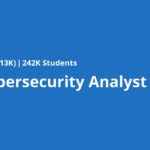Cybersecurity is a hot topic today, with data breaches making headlines and companies pushing for security training. You might wonder: could I actually make a career out of this stuff?
The short answer is yes. Harvard University has made it easier than ever to get started with their cybersecurity certificate programs.
I once thought cybersecurity was only for tech wizards. But Harvard has opened it up to everyone. They offer programs for beginners and business leaders alike.
What Exactly Does Harvard Offer in Cybersecurity?
Harvard’s offerings in cybersecurity are quite impressive. They have several different options to fit your goals and schedule.
The Free Option: CS50’s Introduction to Cybersecurity
This is the game-changer. Harvard’s CS50 program offers a free cybersecurity course. David Malan, known for his popular Harvard course, created it for both tech and non-tech people.
The course spans five weeks. You’ll learn about:
- Hacking and cracking techniques
- Social engineering and phishing attacks
- Password security and single sign-on systems
- Brute-force and dictionary attacks
- Biometric security
- Multi-factor authentication
- Password managers
And here’s the best part: You can earn a free certificate of completion. Not just course materials, but an actual Harvard certificate.
One Reddit user shared their experience: “I’m doing the cybersec (the free option) and thinking of doing SQL. I’ve done the excellent python CS50p with David Malan. I learned new stuff and re-learned many things I assumed I knew.”
The Professional Option: Harvard VPAL Cybersecurity Course
For a more in-depth experience, Harvard’s Office of the Vice Provost for Advances in Learning offers an 8-week course. It’s called “Cybersecurity: Managing Risk in the Information Age.”
This course costs $3,198 and requires 8-11 hours of study each week. It’s designed for business leaders, executives, and cybersecurity professionals who want a deep understanding.
Andreas F., a CEO who completed the course, said: “The course provides an excellent basis for taking a holistic view of cybersecurity and developing a keen eye for critical details. The exchange with experienced tutors, assessors, and participants was invaluable.”
The Graduate Certificate Program
For serious credentials, Harvard Extension School offers a Graduate Certificate in Cybersecurity. This program requires four courses – two core and two electives.
Each course costs $3,340, making the total around $13,360. The program covers:
- Data network infrastructure and communications technology
- Security risk assessment and mitigation strategies
- Enterprise information security policies
- Network security monitoring protocols
The Full Master’s Degree
Harvard also offers a complete Master’s Degree in Cybersecurity through Harvard Extension School. This involves 11 online courses and a capstone project.
The curriculum is flexible and self-paced. You can study part-time and choose courses that align with your career goals. Core courses include application development, cloud computing, compliance and controls, and risk assessment.
Why Harvard’s Approach Works So Well
I’ve reviewed numerous cybersecurity training programs. Most are either too complex for the average person or too simplistic. Harvard’s approach stands out by finding a middle ground.
Harvard’s courses teach a critical view of cybersecurity. They show how security is a trade-off between usability and risk. It’s not about achieving absolute security, but finding a balance based on risks and rewards.
David Malan introduced this concept in the course: “Learn to view cybersecurity not in absolute terms but relative, a function of risks and rewards (for an adversary) and costs and benefits (for you).”
This shift in perspective is transformative. Instead of aiming for complete security, you focus on what’s reasonable for the situation. It’s about finding a balance that makes sense.
The Numbers That Will Shock You
Before we explore the programs further, let’s look at some statistics. They highlight the growing importance of cybersecurity.
| Cybersecurity Statistic | 2020 | 2021 | Change |
|---|---|---|---|
| Average cost of a data breach | $3.86 million | $4.24 million | +10% |
| Average attacks per company | 206 | 270 | +31% |
| Global cyber intrusion activity | Baseline | +125% | More than doubled |
Consider this: Data breaches now cost over $4 million on average. That’s more than many people earn in their lifetime. Companies face 270 cyberattacks annually.
This is no longer just an IT issue. It’s a matter of business survival.
Who Should Take These Courses?
Harvard’s cybersecurity programs cater to various audiences. Let’s see who each program is best for.
CS50 Cybersecurity (Free Course)
Perfect for:
- Complete beginners who want to grasp cybersecurity basics
- People considering a career change into cybersecurity
- Business professionals who need to understand security risks
- Anyone looking to better protect their personal data
One Reddit user noted: “If you’re a nerd working a retail job and you hate your life, a career in cybersecurity could be your ticket to 4-10x your current income and sitting in an air conditioned room all day.”
VPAL Professional Course
Perfect for:
- Business executives and leaders
- Risk analysts and technology specialists
- Information security managers
- Anyone needing to grasp cybersecurity from a business angle
Graduate Certificate and Master’s Programs
Perfect for:
- IT professionals seeking formal credentials
- Individuals aiming for career advancement in cybersecurity
- Those requiring graduate-level education for their roles
- Professionals looking to transition into cybersecurity leadership
What You’ll Actually Learn
Let’s dive into what these programs teach. We’ll focus on CS50, the most accessible starting point.
Week 1: Account and Data Security
You’ll learn how to safeguard your personal and professional data. It’s not just theory; you’ll gain practical skills right away.
Key topics include:
- How passwords get stolen
- The importance of password managers
- Setting up two-factor authentication correctly
- Spotting social engineering attempts
Week 2: Device and System Security
This week delves into securing your devices and understanding system vulnerabilities.
Week 3: Network Security
You’ll dive into network threats and how to defend against them. This includes grasping how hackers exploit vulnerabilities in networks.
Week 4: Web Security
Web applications are ubiquitous, yet often the most vulnerable to attacks. This week, you’ll learn about common web vulnerabilities and strategies to sidestep them.
Week 5: Digital Forensics and Incident Response
The last week focuses on what happens after a security breach. You’ll explore basic forensic techniques and incident response protocols.
The Real-World Impact
Here’s something most people don’t realize: Cybersecurity is more than just thwarting hackers. It’s about grasping business risk and making informed decisions.
Consider these real-world costs of data breaches:
- Lost business costs: $1.59 million on average (38% of total breach cost)
- Detection and escalation: $1.24 million (29% of total cost)
- Post-breach response: $1.14 million (27% of total cost)
- Notification costs: $270,000 (6% of total cost)
Think about that for a moment. Companies face over $1.5 million in lost business after a breach. This is before they even begin to address the issue.
Industry Targeting and Geographic Distribution
The data reveals some intriguing patterns about who gets targeted most:
| Industry | Percentage of Attacks |
|---|---|
| Consumer goods & services | 21% |
| Industrial/manufacturing | 16% |
| Banking | 10% |
| Travel & hospitality | 9% |
In terms of geography, the United States accounts for 36% of all cyber incidents. The UK follows with 24%, and Australia with 11%.
How to Get Started
My recommendation? Begin with the free CS50 cybersecurity course. Here’s how to do it:
- Go to the Harvard OpenCourseWare website (not edX – the certificate is only free through Harvard’s direct platform)
- Create a free account if you don’t already have one
- Enroll in CS50’s Introduction to Cybersecurity
- Watch the introductory lecture to get a feel for the teaching style
- Complete the first week’s assignment to see if the workload works for you
The course is self-paced, allowing you to take as much time as needed. Most complete it in 5-10 weeks, dedicating 2-6 hours weekly to coursework.
Career Opportunities and Salary Expectations
Let’s discuss the financial aspect. Cybersecurity is one of the fastest-growing fields in tech, with salaries reflecting this demand.
Entry-level cybersecurity analysts start at $50,000-$70,000 annually. With experience and additional certifications, salaries can reach $100,000-$150,000. Senior roles and management can earn $150,000-$250,000 or more.
But here’s the thing: You don’t necessarily need a computer science degree to enter this field. Many successful cybersecurity professionals come from diverse backgrounds.
One hiring manager shared this insight: “As someone who has been a hiring manager for Database and BI teams for 5+ years now, this type of course will set you on the right path. You don’t really even need a degree to do Data Analysis or Business Intelligence. I never really check for degrees. You can either do the work, or you can’t.”
The Technology Skills You’ll Develop
Harvard’s cybersecurity programs focus on practical skills, not just theory. You’ll gain technical abilities that employers value:
Technical Skills
- Vulnerability assessment tools
- Network security monitoring
- Incident response procedures
- Risk assessment methodologies
- Security policy development
Business Skills
- Risk communication to executives
- Budget planning for security initiatives
- Compliance and regulatory understanding
- Vendor security evaluation
Common Misconceptions About Cybersecurity Education
Misconception #1: “You need to be a programming expert to understand cybersecurity.”
Reality: While technical knowledge is beneficial, many cybersecurity roles focus more on risk management, policy development, and business processes.
Misconception #2: “Online certificates aren’t respected by employers.”
Reality: In cybersecurity, practical knowledge and demonstrable skills are more important than where you learned them. Harvard’s reputation is a plus.
Misconception #3: “You need years of IT experience before starting in cybersecurity.”
Reality: Many cybersecurity roles are entry-level friendly, with opportunities in security operations and compliance.

Tips for Success in Harvard’s Cybersecurity Programs
Based on student feedback and course reviews, here are the strategies that work best:
Time Management
Set aside dedicated study time each week. The courses are self-paced, but consistency is key. Most successful students study 2-3 times per week, avoiding marathon sessions.
Hands-On Practice
Don’t just watch the lectures. The assignments and projects are where the real learning happens. As one student noted: “The lectures are the starting point, then you are gonna do a lot of research and reading (and writing).”
Community Engagement
Participate in the course forums and discussions. Other students often have insights that can help clarify difficult concepts.
Build a Portfolio
Document your projects and assignments. As one experienced professional put it: “A kick-ass GitHub repo is much more impressive than any degree/certificate.”
What Happens After Certification?
Completing a Harvard cybersecurity certificate is just the beginning. Here’s your roadmap for what comes next:
Immediate Next Steps
- Update your LinkedIn profile with your new certification
- Start following cybersecurity news and blogs to stay current
- Join cybersecurity communities and professional organizations
- Consider additional certifications like Security+ or CISSP
Long-Term Career Development
Many students use Harvard’s cybersecurity certificate as a stepping stone to more advanced certifications and roles. The key is to keep learning and stay current with the rapidly evolving threat landscape.
The Bottom Line
Harvard’s cybersecurity certificate programs cater to all levels. Whether you’re new to the field or a seasoned executive, there’s a program for you. Each option aligns with your needs and budget.
The free CS50 cybersecurity course is an amazing opportunity. It’s rare to find a Harvard education in cybersecurity for free. This is a chance you shouldn’t miss.
Cyberattacks surged by 125% in 2021. Data breaches now average $4.24 million in cost. Cybersecurity skills are not just valuable; they’re critical.
My advice? Begin with the free course. If you’re hooked, you can always move to a paid program. But don’t delay. The cybersecurity field is booming, and early movers get the best jobs.
In a world filled with digital threats, Harvard has made it easier to acquire the necessary skills. You can protect yourself, your organization, and even build a fulfilling career in cybersecurity.
























